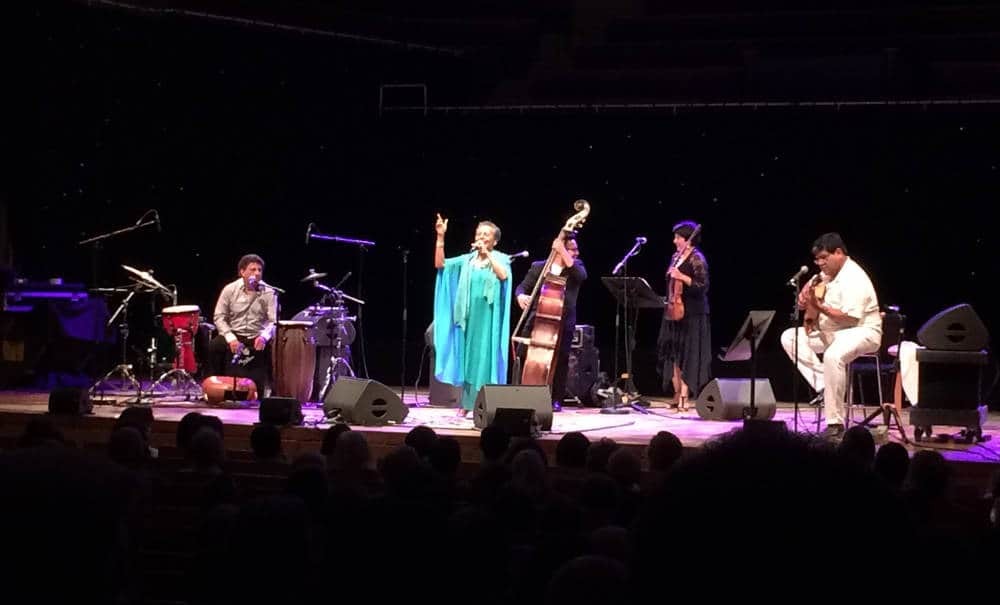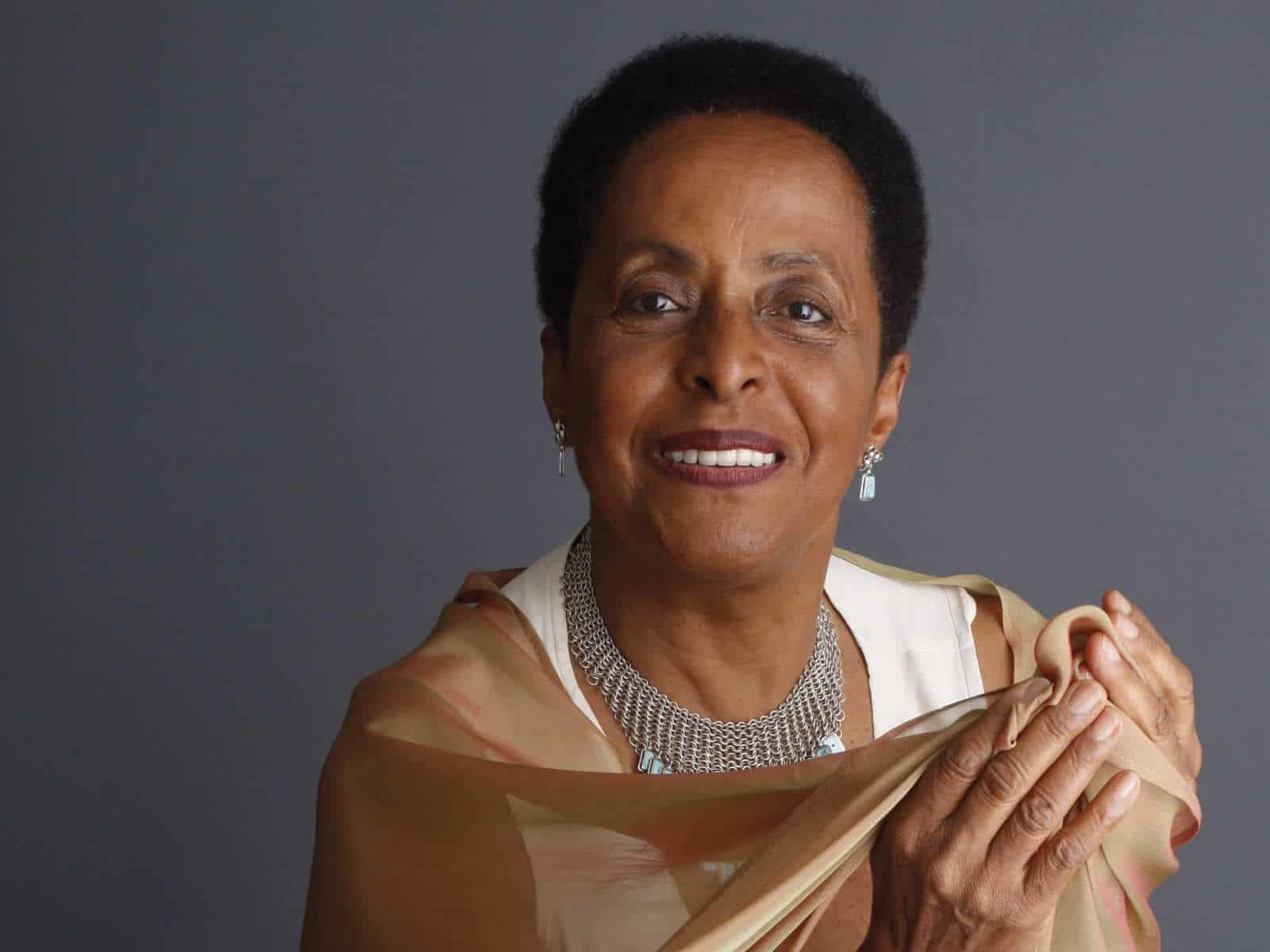Susana Baca
Waltons World Masters Series
22 June 2017
National Concert Hall
‘A world-class world music diva.’
– The Guardian
Did you attend this concert?
We would appreciate your thoughts about it.
Performance
When Thursday, 22 June 2017
Where National Concert Hall, Main Auditorium
Presented by Waltons New School of Music
Supported by RTÉ lyric fm
This concert was recorded for broadcast by RTÉ lyric fm.
Susana and her group in performance at the National Concert Hall.

Susana Baca Group
Susana Baca • Vocals
Hugo Bravo • Percussion
Ernesto Hermoza • Guitar, Charango
Oscar Huaranga • Bass
Maria Helena Pacheco • Violin
‘Her…performance was luminous, her powerful yet delicate voice resonating with remarkable purity.’
– Los Angeles Times
‘The music retains its undulating sensuality, call and response vocals, pinpoint arrangements and peppery rhythms…and stage centre is the sublime Baca herself, an expressive singer and luminous presence whose sultry dance moves and ability to establish a mood and hold it are mesmerizing.’
– Seattle Times
‘Baca crafts an innovative and organic take on the Afro-Peruvian musical tradition, in the process catapulting herself to the forefront of an Afro-Peruvian revival.’
– NPR World Café
Susana Baca
Susana Esther Baca de la Colina was born in Chorrillos, a poor Afro-Peruvian barrio south of Peru’s capital Lima, where descendants of slaves have lived since the days of the Spanish Empire. Her mother, a cook and washerwoman, taught her to dance. Her father, a chauffeur, played guitar. ‘We lived on a small street, really more of an alleyway where many servants lived’, she says. ‘He was, in effect, the official musician of the alleyway.’ Baca soaked up the traditional songs and performances of Chorrillos, often linked to religious festivals, that were an integral part of its social interaction and expression. She was also influenced by popular media made available through radio and cinema, and she had the opportunity to see and hear some of the greatest Latin American and Caribbean musicians and dancers of the day. Living in a neighbourhood without electricity, however, meant that her main sources of inspiration came from her immediate surroundings: family, friends and neighbours who gathered together to play homemade or improvised instruments, producing unique and complex music that remained with Baca and shaped her aesthetic.
Despite her obvious love of music, Baca at first took her parents’ advice to follow a more economically secure path than that of a musician, and she worked as a primary school teacher in her early twenties. However, the attraction of music was simply too great. As she recalled to Kim Sevcik in Arts International magazine, Baca’s determination to perform led her to quit teaching after just three years in the field: ‘Enough! I want to be a singer, and that’s what I’m going to do.’ Baca soon learned how difficult it would be to succeed as a performer and interpreter of traditional Afro-Peruvian music. In the early 1970s, Black Pride movements – influenced by both the American Civil Rights movement and decolonization by European powers in most African countries – had only just begun to penetrate Latin America. In addition, as Baca found, most audiences preferred commercial fare to more serious material.
Undaunted by these challenges, Baca and her husband, Bolivian-born sociologist Ricardo Pereira, concentrated on collecting and preserving traditional folk music from around Peru and reinterpreting it through Baca’s live performances. ‘I would go to small towns where black Peruvians lived, and I would approach old men and ask them to sing the songs their great-great-grandfathers had sung as slaves, and then I would take notes, or I would just try to remember them’, she recalled to Sevcik.
Baca also worked with the renowned Peruvian composer and singer Chabuca Granda, who shared her interest in Afro-Peruvian culture and became her mentor. Granda, who played a major role in disseminating and popularising the music, helped Baca to overcome two obstacles. ‘Women in Peru weren’t supposed to sing on stage’, says Baca. ‘It was seen as lowly, like prostitution. And Afro-Peruvian music was considered the music of drunks, of illiterates, a remnant of the racism that endures to this day.’
Baca’s debut as a performer was simple and straightforward – just the singer with guitar accompaniment – but the response from her audience was overwhelming. Baca continued to perform throughout the 1970s and 1980s; securing a recording contract, however, was a more difficult challenge. Although she came close to recording through her work with Chabuca Granda, Granda’s death in 1983 put these plans on hold. Instead, Baca focused on her live performances as well as compiling some of the best work by fellow Afro-Peruvian singers. The result, Del Fuego y del Agua (1992), was an album that explored the range of African-influenced music styles, both in traditional and contemporary arrangements. The 150-page book that accompanied the release also interpreted and preserved this musical heritage.
Following the album, Baca continued her mission of interpretation and preservation by founding with her husband, in 1992, the Instituto Negrocontinuo (Black Continuum) in Lima, an organisation dedicated to preserving Afro-Peruvian culture – ‘a museum of memory’ she calls it, although the organisation also funds and develops new artistic work. As a performer, she reached wider audiences in Peru during the 1980s and 1990s, as Afro-Peruvian musical styles influenced contemporary musicians across ethnic and socioeconomic lines.
The chance viewing of a Baca performance on video by the Luaka Bop record label founder and former Talking Heads front man David Byrne led to Byrne’s interest in compiling an album of Afro-Peruvian songs for the label. Released in 1995, The Soul of Black Peru opened with Baca’s rendition of ‘Maria Lando’ – about a servant girl for whom ‘there is no dawn, there is no noon, there is only work for others’ – widely acknowledged by critics as the collection’s outstanding track. Baca followed this international recording debut with concert appearances in the United States, which were ecstatically received by audiences and critics alike.
She returned to Peru to record most of her first full-length album for Luaka Bop. The self-titled Susana Baca, released in 1997, featured striking instrumental arrangements that beautifully set off Baca’s pure vocal delivery and emotional intensity. The results were electrifying. A series of acclaimed concerts in North America and Europe followed.
Baca’s second album, Eco de Sombras (2000), was recorded mostly in her home studio in Lima with a range of musical colleagues and explored the range of themes that had by now become strongly identified with Baca’s work. ‘Eco de Sombras’ tingle-factor lies in the way it straddles past and present and so creates its own climate’, a reviewer in New Internationalist noted.
More acclaimed albums followed, including Seis Poemas (2009) and Afrodiaspora(2011). In 2011 Baca was also appointed Peru’s Minister of Culture in the Ollanta Humala government, becoming the second Afro-Peruvian cabinet minister in the history of independent Peru. And in the same year she was elected to the Organization of American States as President of the Commission of Culture for the period 2011-2013.
For decades, Susana Baca has represented Peruvian music to the world. From her origins in a servant’s alley to her current status as an internationally-acclaimed artist, it has been an inspiring and unlikely journey, and we were honoured to bring her to Ireland.
Selected YouTube Videos

